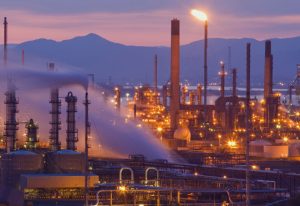Exhausted Catalyst
Desulphurisation catalysts work primarily through a process called hydrodesulfurization (HDS). In this process, sulfur-containing compounds in petroleum are reacted with hydrogen gas in the presence of a catalyst. This reaction typically takes place at elevated temperatures and pressures. The catalysts used are generally composed of metal sulfides, with cobalt-molybdenum and nickel-molybdenum on an alumina base being the most common. The catalyst facilitates the breaking of the carbon-sulfur bonds in the sulfur-containing molecules, and the sulfur is converted into hydrogen sulfide (H₂S). The hydrogen sulfide is then removed from the hydrocarbon stream and can be further processed into elemental sulfur or sulfuric acid.
Applications of Desulphurisation Catalysts
1. Refining Oil: In oil refineries, desulphurisation catalysts are used to process various petroleum products to reduce their sulfur content, making them cleaner-burning and compliant with environmental regulations. This includes the treatment of gasoline, diesel, jet fuel, and heating oils.
2. Natural Gas Treatment: Desulphurisation catalysts are also essential in treating natural gas. Natural gas often contains sulfur compounds that must be removed to prevent corrosion in pipelines, reduce pollution upon combustion, and improve the overall quality of the gas for residential and industrial use.
3. Coal Gasification and Liquefaction: Coal, when gasified or liquefied, produces syngas (a mixture of hydrogen and carbon monoxide) that contains various impurities including sulfur compounds. Desulphurisation catalysts are used to clean this syngas before it is further processed or used as a fuel.
4. Tail Gas Treatment: After the initial removal of hydrogen sulfide using the Claus process in refineries, the tail gases may still contain small amounts of sulfur compounds. Desulphurisation catalysts can further clean these gases, ensuring that emissions meet environmental standards.
5. Fuel Cells: In certain types of fuel cells, particularly those that operate on hydrocarbon-based fuels, desulphurisation catalysts are used to purify the hydrogen feed, ensuring that sulfur does not poison the cell’s catalysts.
The use of desulphurisation catalysts is crucial for adhering to environmental standards and promoting cleaner energy usage globally. By removing sulfur from fuel sources, these catalysts help mitigate the environmental impact of fossil fuel consumption and pave the way for cleaner technologies.

Customised recycling solutions
We provide customised recycling solutions to the generators of spent catalysts arising from Oil Refining, Petrochemical, Syngas and Fertilizer Industries.
It is our aim to provide commercially competitive recycling options with an emphasis on environmentally sound management.
Although it is the obligation of the generators of the spent catalyst to classify the material, our knowledgeable and friendly staff can offer advice and assistance with regards to:
- Packaging Requirements – Whether material should be shipped in bulk, UN/DOT approved drums, catalyst bins or super sacks.
- Transport Regulations – Our staff are fully conversant with the latest transport regulations and regularly attend courses and updates covering the transport of dangerous goods by land (ADR), sea (IMDG) and air (IATA) as well as 49CFR for movements within the USA.
- Applicable Environmental Regulations – We have years of experience in the transboundary movement of hazardous waste, non-hazardous waste, hazardous and non-hazardous metals and concentrates.
A network of agents and associates around the globe together with long-term relationships with fully licenced, ISO9001 and ISO14001 certified recycling facilities, enable us to provide the most suitable, commercially competitive options for each generator.
Site visits / environmental audits are available where required.
Many of the recovered metals are returned to the industry in the form of high-purity raw materials thus closing the recycling loop.
Please do not hesitate to contact us to discuss your Spent Catalyst Recycling options.
For more about us, please click here.
How Did We Do?
It is our constant goal to offer the best possible service to our clients at all times. If we have worked with you at any point in the past, please take a moment to visit the Google Maps listing below and share your experience with us.
Contact Us
If you would like to speak to someone directly about our exhausted catalyst service, please call us on +44 (0)20 7183 0651 or visit our contact page, or contact us via LinkedIn and we will be happy to answer any of your questions.







